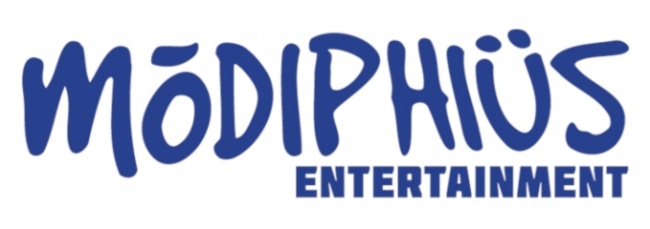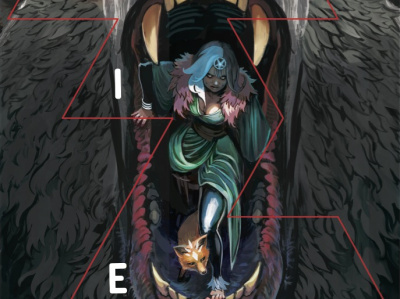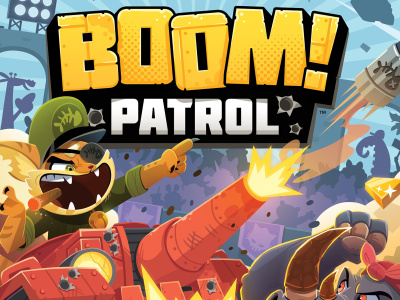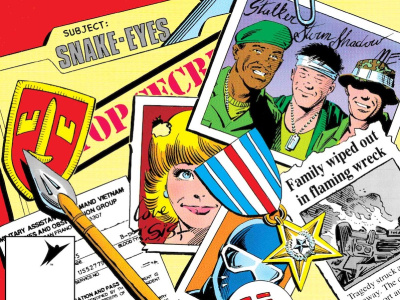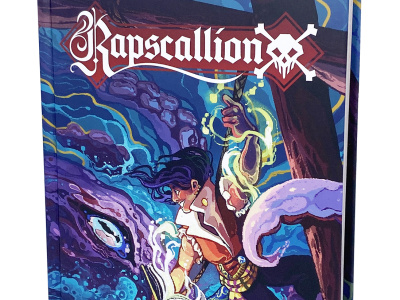We caught up with Modiphius CEO Chris Birch recently and talked about the history of Modiphius up through the recent announcement of the Elder Scrolls license (see "Modiphiuis Brings ‘Elder Scrolls’ to Tabletop"), the range of games the company sells, his view of the RPG business, and how the company interacts with retailers.
ICv2: Maybe you could start off by telling us a little bit about the history of Modiphius. When and how were you founded and how did you start business?
Chris Birch: Well, I had a T‑shirt label called Joystick Junkies before, which I was running for 14 years. Whilst I was doing that, I wrote a game, a roleplaying game, called Starblazer Adventures, based on a British comic book. I did that with Cubicle 7 Entertainment. That was a challenging, but fun experience. I didn't pursue that any further until I wanted to get out of fashion. Kickstarter had started bubbling along.
I saw it was a good opportunity there. I decided to create a fun side business for me and my wife Rita as Modiphius and do some little PDFs. We started with Achtung! Cthulhu, which was driven by my childhood passion weird war stories reading Sgt. Rock and the old Weird War comics as a kid, which I used to get from my grandfather's second‑hand bookstore.
To cut a long story short, we ended up doing a Kickstarter, and it was a spectacular success, so we set up Modiphius, with me and my wife working from my basement flat with a graphic designer in Amsterdam and gradually started taking on freelancers and grabbing Achtung! Cthulhu, which was our first roleplaying game line.
Because we had such a big success with that, it gave us the resources to grow and re‑launch the Mutant Chronicles roleplaying game line. We were then able to pick up the Thunderbirds board game rights, which we did with Matt Leacock. We then slowly grew the business.
From the beginning, I knew that Kickstarter was amazing and we were doing well, but we shouldn't rely on it. We signed up with Impression at the beginning. I dealt with a lot of distributors from the fashion business. We worked hard to try to build up our distribution business to be healthy, and also our online business through our web store.
I never expected it to be a success. I thought we'd fund a couple of books and I'd be able to take a day off a week and do this for fun and pay for some holidays, but it was such a big success that we were like, "Gosh, we've got to do this properly." Again, right at the beginning, we tried to structure the business professionally to grow, to build a big fan base. I used to run a PR agency for video games companies; I ran the first Internet PR company in the UK; so I had a lot of experience in promoting things and getting great PR.
I used all of that, all the resources and experience I've built up over years to really throw myself at the industry create a real passionate company. We bring in a lot of partners to use our logistics and marketing, where they don't really want to be involved in that sort of thing.
That's helped grow the business as well. Obviously, more and more licenses. Star Trek was the pinnacle of about three years' work to get those rights. Then Fallout obviously was a huge launch for us, spectacular, and more recently Vampire ‑‑ The Masquerade, taking on those rights.
We've built and built and built working with great brands, but also continuing to develop our own intellectual properties like Achtung! Cthulhu. We've got some more in the works for next year. We're now 45 people strong. It's come a long way since those first early days.
What happened to the clothing company?
You'd call it streetwear. We did T‑shirts, hoodies, jackets, shirts. You would find us in, say, Urban Outfitters or boutique stores and high street stores in the UK, like Topshop.
I set out to make video games graphics so cool that people who hated them would have to wear them. It was a fun challenge for me. We kind of did it. After 14 years I was ready for a big change. I realized that at the end of the day I love tabletop games, and why not use my experience to work on something I was really, truly passionate about.
It shows, because in the six, seven years we've been running Modiphius, we're three times the size the clothing company ever was.
What were the sources of financing for Modiphius? Obviously, you had Kickstarter. Was that the only source of financing?
We never took any loans. We never took any investment. It was obviously me and my wife spending our hours on it. We were lucky that that first Kickstarter was a success, but I was also adamant that it wasn't our money.
I've always been very good at budgeting and I've had to budget fashion business, photo shoots, and events, and all kinds of things through my career. We put that money in the company and we didn't immediately go, "Gosh, let's book every convention in the world and fly there and show off what we do."
We sat on the money, and that is going to pay for the delivery of these books, and worked really hard to get a stream of income coming through from Impressions, from the distribution, and from our website. We soon got to a point where distribution was paying for the wages and the web store, so it really helped.
I tell a lot of new people starting Kickstarter to make sure that they price themselves with a concern into distribution, because it's great doing Kickstarter. It's this massive surge of money, but it's a bit unreal. I think it's very dangerous to just rely on that one source. It's good to have a wide variety of funding sources. It's been great.
To this day, we've never had to go to the bank or for investments. We've nurtured the business, grown when we needed to, sometimes not as quick as you want to. It's actually only this year we took on another 12 staff earlier in the year as an investment in the business to really focus on the growth we needed too for Fallout, Vampire, Elder Scrolls and some other projects we've not announced yet.
Are you doing any of the creative work in‑house, or is that all freelance?
We have 33 people in the London office, another 12 externally who are graphic designers and 3D designers and 3D sculptors who create the miniatures. All our artists are external, so the cover art and interior artworks for the books are created by them. We have five layout designers who do all the interior graphic design. All the teams that conceive and write, manage the projects are internal, but we use, in general, external freelance writers and editors and proofreaders. We generally create the concepts here and then brief people externally, "This is what we're looking for."
How many products are you doing this year?
Well, we have a lot of lines. We have Infinity and Conan and Star Trek and John Carter. They each have a path, roughly speaking, about a half‑dozen books coming out this year still. Fallout has two or three waves this year of probably 20 products coming. Elder Scrolls is coming out at Christmas. That's one or two main projects.
We all have a lot of partners we released product for as well. I would say we probably have about a hundred to two hundred products out this year still to come.
On something like Vampire, are they handing you a completed creative work, or are you doing some of the creative work based on their IP?
At the end of the day, White Wolf still owns the brand and ultimately has final say. What we are doing is effectively running the publishing for Vampire ‑‑ The Masquerade. We're saying, "OK, we want to do these products." They sign it off and we just get on and make them. It's a great relationship.
They're trusting us to get on and drive the brand. Obviously, we have to work closely with them because they're working on all kinds of brand extensions. There's the Bloodlines 2 video game coming out. We work hard to work in synergy with other things so it doesn't feel like it's its own product.
On something like Free League, you're just doing a translation of work that was originally produced in another language? How does something like that work?
Free League were some developers who had produced the Mutant ‑‑ Year Zero roleplaying game in Swedish, and have done the translation through a Kickstarter. They needed help with distribution. We partnered with them to get them into our distribution chain.
We then followed that up with their Tales from the Loop brand, with Forbidden Lands. Another partner, Järnringen, who had a game called Symbaroum that was very beautiful. Then they've got to the point where they're big enough to do their own distribution. We're continuing to sell through our web store, but they're now handling their own distribution with Impressions as well. We helped them grow to the point they don't need us.
It sounds like you have a complete range from totally in‑house intellectual property to externally‑produced games that you act as the publisher for in English. Is that accurate?
Yeah, that's pretty much right. We call it A&R and look for great‑looking roleplaying games, board games or other games that we think fit the style of game that we would want to release ourselves. We also then obviously license and create our own games. We've got two big IPs of our own launching next year.
Licenses are a fantastic vehicle to grow the business. It's big, vast amounts of fans. They come spend money on the products. It's very easy to generate the products. We have a great relationship with people like Bethesda and CBS, etc. Of course, we all want to create our own games, or rather our own worlds.
Of the growth that we're seeing from Modiphius through Vampire and Star Trek, I've been able to hire a great managing director who came from EndemolShine, and he's a guy called Cameron Dicks. He's actually freed me up to start focusing on some of our own IP more, looking more at Achtung! Cthulhu. We're relaunching that later this year, which is our first project.
We've got two other IPs that we're working really hard on in the background to launch next year as well. Again, much like Kickstarter and distribution, you can't be relying on Kickstarter, you can't just rely on licenses. You need to really be building your own brands, because that's why we love working in games. We want to create our own games and create our own stories.
Let's look at a little bit bigger picture. It seems you were fortunate in that you started publishing RPGs at about the time the RPG business was beginning to expand again. What's your assessment of the current RPG market? Maybe start with North America and then other territories that you're in.
We've certainly seen a great deal of success with Vampire and Star Trek. To a certain extent there's been a growth in the other games. I think we've been lucky that we've built a great brand name, so retailers know that a Modiphius roleplaying product is a great print quality, will probably be a strong design, great artwork. It's certainly a mark of quality.
I remember when we first started with Impressions that they would say, "Well, if it's a new RPG, you might sell a few hundred." Now it's a lot more than that and it's certainly had an impact. D&D getting it right again has also really helped. It's a bit like I think when Games Workshop is successful, everyone does well. I think D&D being successful again is having a positive impact on lots of people. It's bringing a lot of new attention to the industry, a lot of new people into the industry.
RPGs are not the biggest‑selling products of the industry, but we've managed to create a name for ourselves. It's not as competitive as board games, for example, where there are dozens of releases each week, and it's very hard to stand out in board games.
Definitely in Europe, there is a growing market for translations, localized editions that we also handle. There is a gradually growing amount of sales of English editions. Certainly, in Germany, we have several distributors that sell our products in English there, and Eastern Europe. Obviously, we're seeing how that goes, but I'm hopeful that we'll see a growing support for roleplaying games.
Miniatures is even better, because it's less dependent on translation. Once you have the core box localized, you can sell miniatures to go with the game relatively easily.
Is North America your biggest sales territory, then, or is it Europe?
Absolutely, yes. I would say America probably accounts for (and this varies slightly across distribution, Kickstarter, direct sales to fans on our web store) roughly speaking about 40 to 50 percent, depending on the product.
Something like a Mutant Chronicles is much more popular in northern Europe, whereas Fallout is very popular in America, as is Vampire. We then have the UK is on average about half the size of the American sales. It's quite substantial. You could argue that we're based here, but the British market is enormous.
I think a lot of American companies and publishers forget that you've effectively got one‑fifth of the sales in the UK in the size of New York State. It's a powerhouse of games retail. As I said, our US sales are about double what our UK sales are. Again, that does vary. Sometimes it's three, four times what the UK sales are. We've got Germany as a big secondary market. France, Eastern Europe, and then places like Australia and New Zealand.
Certainly, if you take Europe as a whole, it's a substantial size. Again, that also varies. We'll sell more roleplaying games in the US but we'll sell equally as many miniatures in Europe because localization issues aren't so big.
If you went from one to a hundred products a year in six years, how much of that is market growth and how much of that is you taking share from other companies?
It's a good question. Those people on Kickstarter weren't spending that money elsewhere and then stopped spending it in shops and started spending it on Kickstarter. There's a mix of people suddenly having so many great games to buy and finding the extra money, but also a lot of new people coming back to the hobby or joining the hobby. The overall market has grown somewhat.
I'm sure we have taken some market share from other companies. I think things ebb and flow all the time. Someone will have a big game that's huge for three months and eat up a lot of market share, and then we'll come along with a new RPG and that will suck some people up.
Are you getting into the book channel here, into bookstores, Amazon?
Well, obviously, Flat River does sell to Amazon. Impressions sell to Ingram, so we end up in Barnes & Noble via Ingram. We get into Books‑A‑Million, etc., etc., so that channel seems to be working for us.
What do you want our retailer audience to know about Modiphius?
I guess like every publisher, we've gone through that hard fight of finding our way with retail. Certainly, having started with Kickstarter (and we've not always got it right), we're working quite hard to build direct‑to‑retail channels for selected products, like for Fallout and Elder Scrolls that cannot go through distribution for various means. Also, to build really interesting programs through distribution.
Our door is always open, and we always love to get feedback, whether it's "You're doing a really awful job [laughs] and here's why," or "You're doing a great job, but can I make a suggestion?" We'd love to hear from retailers with ideas about how we can improve our relationship with them, how we can support them better, because as much as Kickstarter is a great entity, we're pulling back a bit from that.
We're only doing Kickstarter now if it's right for the product, if Kickstarter as a marketing platform is useful, and the product's ready to go. The Fallout game was a pre‑order. The Vampire game was a pre‑order. Elder Scrolls will be going straight to retail as well. We've made that difficult transition from a company that was built on Kickstarter to engaging quite heavily with distribution and retail.
We've got a lot of work ahead of us, but we'd love to hear from them how we can do it better.
You have some products, you said, that don't go through distribution, that are only available directly from Modiphius. Why do you do products like that, that's probably something that retailers don't like, right?
Actually, in all cases, it's always available direct‑to‑retailer. We have a website called modiphiusretail.com. We add products there that, because the cost price is so high, it doesn't work in distribution, but we can sell it direct to retailers. We want them always to be able to order it from us so that we can have it for the customers. It's a bit like some things, I'll give you an example.
We're doing a Crashed Vertibirds from Fallout, giant, really, really big sets of resin pieces. The cost price is so high that to sell it through distribution, the price would have to be ridiculous. However, we can sell it to retailers direct with a very healthy margin to make it worth their while.
That's the goal, is that there's never something a retailer cannot buy from us direct, but we can't always guarantee that it will go to distributors.
What you're saying is, you've moved the distribution cost from an external distributor internally and that allows you to keep the price lower. Is that saying that you're more efficient than your distributors at distributing?
No, no, I mean, obviously, numbers will be lower if you do that. The custom thing is like that Crashed Vertibird, for example, if we put it at the price we would need to put it at to sell it in distribution, I'm pretty sure we would sell a lot less, because it would be an insanely high price. It wouldn't be fair on customers in order to get the margin that we need.
By selling it direct to retailers, we can keep the price fair and make sure that a retailer can order it in. They can order other stuff from us to make the order worthwhile. We make it very clear to distributors that retailers can't order distribution stock at the same time. We don't let them order things that are available through distribution.
Are you shipping direct-to retail orders from the UK to US retailers?
Yes, yes.
What are your biggest products going to be this year? What are you most excited about for the retailer portion of your releases?
We have the next wave of Fallout which is based around the Raiders faction. That comes out in August at retail alongside the Fallout roleplaying game, which was a big project for me to pull in. We're going to have the next big release of Vampire, which is the Fall of London which is a campaign I conceived to really support new Vampire players and latch players as well.
Then of course, the Elder Scrolls Call to Arms game that's going to come in December, so November, December for Christmas.
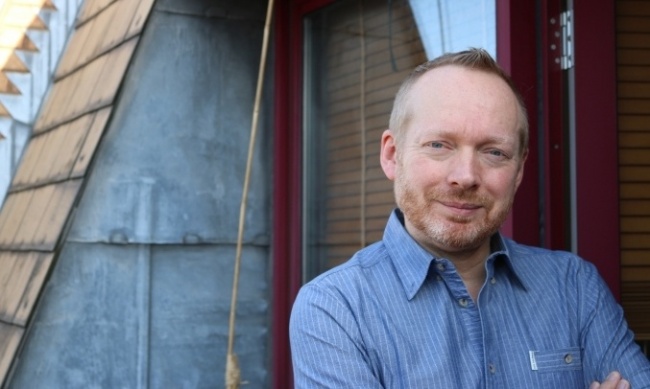
History, the Games Range, the RPG Business, How Modiphius Interacts with Retailers
Posted by Milton Griepp on June 4, 2019 @ 12:38 pm CT
MORE GAMES
New 'Die' Story Out in November, Alongside 'Die Quickstart RPG Guide'
August 11, 2025
The Die: Loaded #1 will be released in November 2025, the same month as The Die RPG Quickstart Game Guide.
New Tank Battle Board Game by Smirk & Dagger
August 11, 2025
Smirk & Dagger will release Boom Patrol, a new tank battle board game, into retail.
MORE NEWS
'Hama Files Editions' Will Include a Letter from the Creator
August 11, 2025
Each issue of the Hama Files Editions will include a letter from Hama with background information about the comic.
New Weird Swashbuckling RPG
August 11, 2025
Magpie Games will release Rapscallion, a new weird swashbuckling RPG, into retail.




